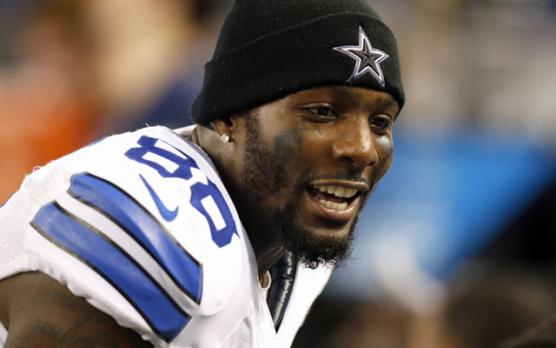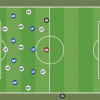Dear Dez,
I'm sure you've never heard of me. I'm a former sports agent who has some experience with NFL contracts. I took either a lead or secondary role in contract negotiations for several wide receivers, including Drew Bennett, Troy Brown, Curtis Conway, Michael Jackson, Shawn Jefferson, Keenan McCardell and Jimmy Smith. A couple of those negotiations were acrimonious and resulted in lengthy player holdouts.
Your performance has justified a contract near the top of the wide receiver market, which Calvin Johnson sets with the seven-year, $113.45 million extension he received from the Detroit Lions in 2012. $53.25 million of Johnson's extension was fully guaranteed at signing if the $4.5 million roster bonus from his rookie contract, which was payable on the same day the new deal was executed, is considered as a part of the guaranteed money.
You've accomplished something that's never been done in Dallas Cowboys history by posting three straight seasons with at least 85 receptions, 1,200 receiving yards and 12 touchdown receptions. Your 41 touchdown receptions since 2012 are the most in the NFL during this three year span.
I don't know whether these latest rumors about you are much ado about nothing or a case of where there's smoke, there's fire. The timing is curious considering your head coach Jason Garrett has made statements about how you've matured for the better part of two years. Taking the team's last publicly reported offer of 10 years for $114 million with $20 million in guarantees and an average of $10 million in the first six years only makes sense if there is something in your past that could come back to haunt you. Otherwise, the Cowboys are lowballing you unless that offer has been substantially increased.
I know you said you would be “highly disappointed” with a franchise tag, which is $12.823 million now that the salary cap has been set at $143.28 million. Accept that your franchise tender is just a part of business in the NFL. Use the tools at your disposal under the NFL Collective Bargaining Agreement (CBA) just as the Cowboys are.
You are in good hands with your representation of Creative Artist Agency's Tom Condon and Roc Nation Sports' Kim Miale. Although they work for you, allow your agents to do their job. Condon had a protracted negotiation three years ago when his client, quarterback Drew Brees, was given a franchise tag by the New Orleans Saints. He made Brees the NFL's first $20 million per year player.
There is no need for you to be in a rush to sign your franchise tender. I recognize that the franchise tender is fully guaranteed when signed and almost $1 million more than you've received overall from your expiring five year rookie contract. There isn't much risk of the Cowboys rescinding your tender. That's only happened three times since the franchise tag system was put in place under the 1993 CBA. It last occurred when the Seattle Seahawks pulled linebacker Leroy Hill's tender during the 2009 NFL Draft. He signed a long term deal with the Seahawks a few days later.
The Cowboys would be doing you a favor by withdrawing your franchise tag. Based strictly on your football ability, you would be able to command a contract with at least $35 million in guarantees and averaging over $13 million per year on the open market regardless of when you became available. It's conceivable that you could become the NFL's highest paid wide receiver by topping Johnson's $16.207 million average per year under those circumstances.
Your franchise tag is the non-exclusive version. This tag allows your agents to negotiate with other NFL teams but if you sign an offer sheet with another club, the Cowboys will have five days to match the offer. If the offer is not matched, Dallas will receive two first round picks as compensation from the signing team.
Let Condon aggressively shop you to other teams during free agency even though you want to stay in Dallas and it's a remote possibility that he'll find a team to sign you to an offer sheet. Wide receiver Joey Galloway in 2000 was the last franchise player to move to another team for full compensation when the Seahawks received two first round picks from the Cowboys. It may make sense for a team picking late in the first round in 2015 with a pressing need at wide receiver and presumably late in the first round in 2016 to sign you to an offer sheet. Knowledge of another team's interest or just setting up a visit with someone else might be enough to spur the Cowboys to increase their offer to you.
Brace yourself for the possibility that there probably won't be much movement in your negotiations until the July 15 deadline for franchise players to sign long term deals approaches despite your franchise tender taking up approximately two-thirds of the team's existing salary cap space. The Cowboys can work around your cap number by restructuring contracts for cap space, including Tony Romo's league high $27.773 million 2015 cap number. Signing your tender before July 15 could undercut your leverage for a long term deal. The Cowboys might not feel any sense of urgency to make a long term commitment having you already under contract for the 2015 season.
Tight end Jimmy Graham and offensive tackle Ryan Clady, who were the only franchise players to sign long term contracts over the last two years, didn't finalize deals until shortly before this July 15 deadline with the Saints and Denver Broncos respectively. In 2012, Brees, kicker Josh Scobee and running backs Matt Forte and Ray Rice didn't sign long term deals until close to the 11th hour. None of these players signed a franchise tender prior to getting a long term deal.
The lag time might benefit you because there could be other developments in the wide receiver marketplace that are favorable to you. Demaryius Thomas, who was taken two picks before you in the 2010 NFL Draft, is in the same franchise tag boat as you. It might be easier for the Broncos to reach an agreement with him because he reportedly rejected an offer before the start of the 2014 regular season that would have made him the NFL's third highest paid wide receiver. This puts the offer somewhere between Percy Harvin's $12,843,500 new money average per year and below Calvin Johnson's deal. With you and Thomas unable to hit the open market, Jeremy Maclin and Randall Cobb, two wide receivers that are clearly inferior to you, could sign deals that are better than the Dallas offer you rejected since they now head the free agent class of wide receivers.
Resist any new overtures from Jerry Jones to have direct talks about your contract with you instead of with your agent. Those talks didn't result in a new contract for you before the 2014 season started. Jones has huge advantage from a business standpoint with virtually any player in this type of dialogue. It is my understanding that part of the reason Jones was able to get offensive tackle Tyron Smith to sign such a team friendly deal was by speaking to him directly.
Any appeals by him about the Cowboys being a family might be persuasive in person but don't lose sight of the fact that there's no such thing as loyalty in the NFL, especially in a salary cap environment. Otherwise, DeMarcus Ware would have led the Cowboys in sacks last season instead of playing for the Broncos. Remember that Hall of Fame running back Emmitt Smith played the final two years of his career with the Arizona Cardinals. If asked for a face-to-face to meeting by Jones or anybody else connected with the Cowboys, decline and instruct him to talk your agents instead. If you and your agents think it's appropriate, then you can accompany them to meeting with the Cowboys about your contract.
You will need to make alternative arrangements to prepare for the 2015 season since you won't be signing your franchise tender before you get a long term deal or the July 15 deadline. You won't be allowed to participate in the offseason workout program, organized team activities or mini-camp while unsigned. You could sign an agreement that allows you to participate in these activities by protecting you in case of an injury but franchise players rarely sign participation agreements. The Cowboys also won't be able to fine you for missing mandatory activities, such as mini-camp, while you aren't under contract.
If the July 15 deadline passes without a long term deal, you'll have a decision to make on reporting to training camp on time. Some franchise players in this position in recent years (Cliff Avril, Dwayne Bowe, and Jairus Byrd) have skipped the early part of training camp to minimize the risk of injury during the pre-season or to protest not getting a long term deal since they weren't subject to a $30,000 fine for each missed day because they weren't under contract.
A better reason to miss training camp or part of the regular season would be because you are insisting on a clause that would prohibit the Cowboys from using a franchise or transition designation on you in 2016 (i.e.; a prohibition clause) in order to sign your tender and end the contract dispute. How important this type of clause is to you might change if you are facing the loss of approximately $750,000 in salary for each week of regular season you missed.
Prohibition clauses aren't easy to get. Defensive tackle Albert Haynesworth was the last franchise player to receive one when the Tennessee Titans franchised him in 2008. His clause had conditions. It was triggered by Haynesworth making the Pro Bowl, having at least 60 percent defensive playtime, or 53 percent defensive playtime and the Titans winning at least 10 games or ranking in the top five in total defense.
Linebacker Lance Briggs and cornerback Asante Samuel had clauses similar to Haynesworth's when they were franchised in 2007 by the Chicago Bears and New England Patriots respectively. Samuel's prohibition clause was triggered by him having at least 60 percent playtime on defense or the Patriots winning at least 12 games. Briggs' clause was predicated on him having at least 75 percent playtime on defense. Offensive tackle Jeff Backus and cornerback Nate Clements had prohibition clauses without any conditions in 2006 when they were respectively franchised by the Detroit Lions and Buffalo Bills.
Some might say that you should play the franchise tag game until it becomes too cost prohibitive for Dallas. A second franchise tag in 2016 would be $15,387,600. You wouldn't get franchised for a third time in 2017 because your number would be approximately $22.15 million, which is 144 percent of your 2016 franchise tag. After making a little over $28.2 million for the next two seasons, you would be an unrestricted free agent at 28 years old. You would still be able to sign a huge deal at that age provided you stayed healthy and didn't have any new non-football concerns for two seasons. You would only need to sign a four-year deal for a more little than $32 million in 2017 to break even with the six year cash flow in the offer reportedly made by Dallas.
It doesn't always work that way. Tight end Fred Davis never got his big payday after tearing his left Achilles tendon during the seventh game of the 2012 season as a franchise player. The injury led to him returning to the Washington Redskins in 2013 on a one-year, $3 million deal (with an additional $750,000 in incentives) since there was limited interest in him during free agency. Davis had a disappointing 2013 season and has been out of football since then.
My concept means you would only have to avoid a serious injury for the 2015 season and any off-the-field the incidents for another year before Dallas would be forced to pay you what you are worth or any other team would on the open market. Another year successfully removed from your past should make it easier for teams to pay you without reservation.
The items in this letter may have already been explained to you by your representatives or might not interest you that much. Regardless, I wish you all the best and hope you get the contract you richly deserve.
Sincerely,
Joel Corry
















